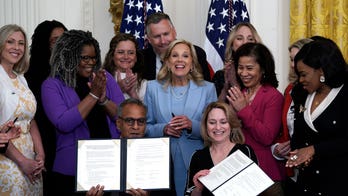Senate Debt Deal Would Let Obama Put Political Pain on Installment Plan
“I think the McConnell plan is more of Washington not taking responsibility, it is a great political plan, it takes the pressure off all of the politicians, but allows us to pass a debt limit without making the hard choices that this country has to make.”
-- Sen. Tom Coburn, R-Okla. on “Face the Nation”
Power Play feels obliged to remind everyone that the federal government is highly unlikely to default on its debts.
The catastrophic consequences of the U.S. government reneging on existing obligations would be so dire that no serious person would consider it. President Obama may use the threat of default as part of his ongoing negotiation with Republicans over his request to increase the government’s $14.3 trillion borrowing limit, but only a madman would actually follow through on such a course.
The administration now uses the phrase “default or fail to meet its obligations/pay its bills” when talking about the ongoing impasse on the borrowing limit, a nod to the fact that cuts to domestic spending, not failure to pay existing debts, is what would ensue if the Treasury runs out of money.
Of late, the federal government has been borrowing 44 cents of every dollar it spends. If there really were an impasse, it would be up to Obama to decide which 56 percent of federal obligations would be met. Avoiding default would have to be the top priority.
Obama has also warned that entitlement programs like Social Security could be disrupted if the logjam over his borrowing request is broken.
But, here again, Obama is the one in charge of deciding who gets paid in the event of a shortfall. While his administration might send scare letters to senior citizens as a bargaining tactic with Republicans, it’s unlikely that the president would tell pensioners that they can’t have the money they paid into the system during their working lives.
Imagine the president keeping open national parks or green energy stimulus projects while telling America’s oldsters that they aren’t getting checks. Not going to happen.
These are the things that Republicans know as they head into the final five days of negotiations before the president’s self-imposed July 22 deadline for a debt deal. The key for the GOP is that Obama’s presidential power is as much a constraint as it is an advantage.
The administration’s publicly stated reason for creating the July 22 deadline was to give Congress time to work through legislation in advance of the Aug. 2 drop-dead date set by Treasury Secretary Tim Geithner. But as Congress showed during late-night action to avert a government shutdown in May, legislative rules aren’t chiseled in stone.
This Friday’s deadline is more of a political bright line for Republicans: the date after which the president will embrace even more radical rhetoric (more “hostage takers” and “gun to the head” talk) and also use threats of default and entitlement disruptions to further squeeze the GOP.
But if Obama can’t break Republicans in the 11 days between his deadlines, he will likely be forced to accept a deal on pretty poor terms at the end. Once Aug. 2 arrives, his executive power will weigh heavier and heavier. He cannot allow default and he cannot allow obligations to Social Security or the national defense to lapse.
The bond-rating agencies have spelled out the two scenarios that would result in a downgrading of U.S. creditworthiness: either an unconditional increase to federal borrowing that shows Washington sprinting toward the fiscal abyss or an unbreakable stalemate on the debt ceiling.
What Moody’s and S&P are saying isn’t that the U.S. will default, but that if Washington is so badly broken that a political solution can’t be found to this obvious problem, worse problems may lie ahead for the world’s largest economy.
If Obama were willing to fool with that over his belief in “shared sacrifice” or a “balanced approach,” the political costs would be simply too great. A narrow tax increase to please his base and save face would not be worth it.
The best-case scenario for the president seems to currently be the plan being hatched in the Senate that would allow him to kick the can on the debt ceiling until next year’s elections.
The proposal, which would spread out already agreed-to cuts over 10 years and create a new panel to make recommendations for fiscal change, would deny Obama a big victory on government spending and keep the issue front and center through the 2012 elections, but it would also get him off the hook in a showdown where there are increasingly no good outcomes for him.
On the upside for the president, it gets Obama out of this current scrape. On the downside, it means that he will have to re-litigate debt and spending issues constantly throughout the remainder of his term – starting in September with the 2012 budget.
Mitch McConnell is offering Obama the chance to take his political pain on the installment plan and that may sound like an increasingly attractive option.
Obama’s Summer Swoon Reinforces Scorched Earth Election Strategy
“44 percent.”
-- President Obama’s latest job-approval rating in the latest Gallup Poll
The lousy economy and budget breakdown in Washington have continued to sour American voters on their first-term president, leaving the president’s once audacious political operation with few options other than a brute-force battle in swing states.
Jaws dropped last week at the news that the Obama juggernaut had raised $86 million in April, May and June from 500,000 supporters. That was a nuclear blast of a fundraising report. It is more revealing, though, that the Washington Times reports today that $35 million of the funds could be traced to only 244 well-heeled bundlers of campaign cash.
The message to any Republican presidential pretenders is that Team Obama will do whatever it takes to win – including taking deep draughts from the well of presidential power to raise money. Any incumbent president with any chance for reelection can raise big money from influential rich people, and that’s what this incumbent president is already doing.
With economic recovery looking increasingly unlikely and Obama’s 2008 raids into Republican states like North Carolina shaping up as difficult, the president and his campaign team are going to have to hunker down and try to use big bales of rich Democrats’ money to win Ohio and/or Florida. It’s not particularly audacious or hopeful of Obama, but it’s what will be required to hold on to his job.
Obama Makes Nod to Base, Swing State Voters With Financial Bureau Pick
“Until President Obama addresses our concerns by supporting a few reasonable structural changes, we will not confirm anyone to lead it. No accountability, no confirmation."
-- Statement from Sen. Richard Shelby, R-Ala., on the pending appointment of former Ohio Attorney General Richard Cordray to be the first head of the Consumer Financial Protection Bureau
Given the fact that Congress is currently the legislative equivalent of a 15-car Beltway pileup, it seems strange that the president would now send to the Senate a controversial appointee to lead a controversial new agency.
But it is the very fact that the Consumer Financial Protection Bureau, the new Treasury agency created by the 2010 Dodd-Frank banking bill, is so controversial that now is a perfect time to make an appointment.
Liberals have demanded that Obama select Elizabeth Warren, the Harvard professor and antagonist of big banks whom he picked to engineer the agency, as its official head. Whether it is because Warren is considering a Senate run against Scott Brown in Massachusetts or that too many Democrats oppose her nomination, Obama will not nominate her.
Instead, the president will nominate Richard Cordray, the bank-busting former Ohio attorney general, for the job. Cordray, who backed Obama in the state’s 2008 primary, is a favorite of liberal Ohioans, who fought hard for him in his bid for a second term against challenger Mike DeWine.
Cordray should be something of a he-Warren for liberals, having long-established credentials as an enemy of big banks and a proponent of jumbo regulations. Plus, his nomination will help re-energize the Obama team in Ohio, where the president is facing stiff headwinds in 2012.
Since the Senate would be unlikely to confirm anyone to the position until the rules regarding the agency’s broad, undefined powers are sketched out more clearly, the president actually felt little pressure to seek a consensus pick for the post.
Perry Running Right on Schedule
“I’m not ready to tell you that I’m ready to announce that I’m in. But I’m getting more and more comfortable every day that this is what I’ve been called to do. This is what America needs.”
-- Texas Gov. Rick Perry to the Des Moines Register
The response from Republicans to the potential presidential candidacy of Rick Perry has made a believer out of the once-skeptical three-term Texas governor.
Perry is on track for a declaration by the end of the month and a campaign launch in time for the Aug. 11 FOX News/Washington Examiner/Iowa GOP debate at the Ames Straw Poll.
Praise from Rudy Giuliani on “State of the Union” Sunday, an op-ed co-authored with South Carolina Gov. Nikki Haley on debt reduction and a continued stream of top tier political talent toward the Perry campaign in waiting are all encouraging signs to Perry backers.
“It’s been better even than we could have hoped,” one political consultant who would likely join the Perry team told Power Play. “You can see that the governor understands the depth of his support among conservative Republicans.”
This week, Perry will work to expand his fundraising base by courting the major Republican donors still uncommitted in the presidential contest.
***Today on “Power Play w/ Chris Stirewalt”: Rep. Kevin Brady, R-Texas, Charles Hurt of the Washington Times and the latest news on the campaign trail. Tune in at 11:30 am Eastern at http://live.foxnews.com/ ***




